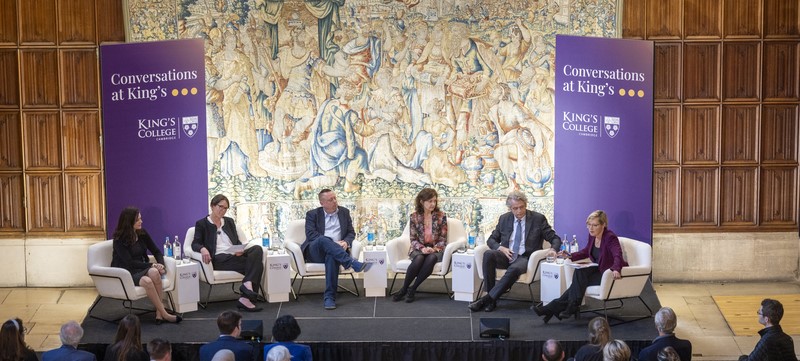
Vanderbilt University, the University of Cambridge, King’s College Cambridge, the White House and the UK’s Government Communications Headquarters recently convened to showcase the power of academic collaboration on critical national security issues like the development of cryptographic algorithms that can hold up against quantum attacks.
The May 21 event at King’s College brought together world-class researchers and academics as well as representatives from industry, and government officials, to explore the latest advancements in research, identify pathways for collaboration, and discuss challenges and solutions for post-quantum cryptography.
Cryptography, a daily part of life for most people, is the technology preventing hackers from reading personal email, posting from people’s social media accounts, or accessing online medical records without access credentials or consent.
Post-quantum cryptography refers to cryptographic algorithms that are designed to be secure against possible threats posed by quantum computers. Such computers have the potential to solve certain mathematical problems much more efficiently than classical computers, and threaten many of the cryptographic systems currently in use. To address this threat, researchers are developing new cryptographic algorithms that are believed to be resistant to quantum attacks.
Vanderbilt Chancellor Daniel Diermeier, who was a participant at the convening, said before the event that he was pleased to have experts from the university contribute to such an important international assembly.
“Through Vanderbilt’s growing body of work in national security and cybersecurity, we know that cross-sector, interdisciplinary collaboration and a cohesive, coordinated strategy are essential to meeting cyberthreats,” he said.
King’s College Provost Gillian Tett lauded the collaborative participation.
“We are delighted to be bringing U.S. and U.K. academics and officials together to address these global challenges,” Tett said. “It is also fantastic to champion female leaders in this sphere.”
David Hyde, assistant professor of computer science at Vanderbilt, said it was exciting to see a shared enthusiasm for quantum research among all academic, industry, and government participants, both in the U.S. and the U.K.
“I’m excited for Vanderbilt University and the other participating institutions to build on this enthusiasm and create new collaboration opportunities that lead to innovation and leadership in the quantum space,” Hyde said.
Mona Ebrish, assistant professor of electrical and computer engineering at Vanderbilt, said academic collaboration brings together diverse perspectives and expertise to tackle complex problems.
“Scientists from various fields provide valuable insights, innovative ideas, and rigorous analysis to advise policy and decision-makers,” Ebrish said. “Through collaboration, academic institutions can leverage their resources, knowledge, and networks to contribute to the understanding and resolution of national security challenges.”
Additionally, the event featured a panel comprised of academic and government leaders who shared their thoughts on the challenges of attracting women to STEM and computing science, and their initiatives and ideas to change the future.
Ebrish said it was refreshing to hear the female panelists discuss their early journeys amid a lack of gender diversity.
“Though things have improved in the last two decades to close the gender gap in the STEM fields, as evident by the remarkable success of the female panelists, their stories serve as a reminder to us that things were much different not too long ago and that we still have work to do until such topics are no longer needed,” she said.
Other Vanderbilt participants at the convening included Douglas Adams, Daniel F. Flowers Professor and head of the university’s new program in national defense and global security; and Padma Raghavan, vice provost for research and innovation and senior advisor to the chancellor. Also participating was Anne Neuberger, White House deputy national security advisor for cyber and emerging technologies.